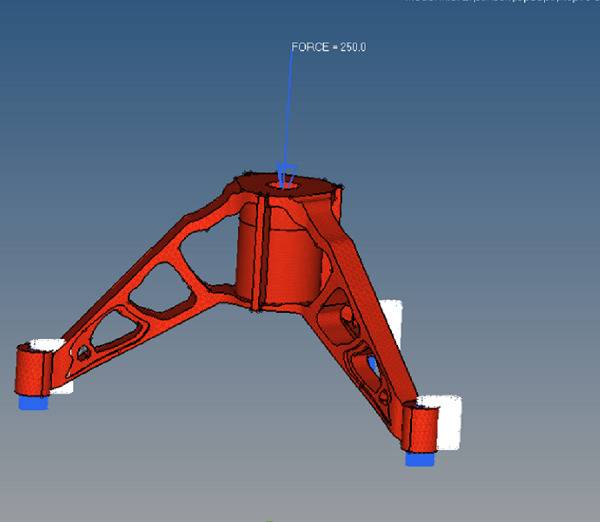Intech Additive Solutions is playing the visionary role in the field of metal-based DMLS 3D printing in India since its inception in 2012. The company encompasses a creative design team, a meticulous analysis team, a dedicated machine shop, an accurate post-processing facility, and an extremely competent quality control services team, which together have carved a niche and enabled them to offer an end-to-end service in the Additive Manufacturing space. Intech Additive Solutions team takes pride in their 30-plus years of metallurgical expertise of running a foundry and 25-plus years of machining expertise, which gives them an edge vis-à-vis understanding of the finer nuances of their industry. The company with this rich expertise in metallurgy and machining, established themselves rapidly as the leader of the Metal Additive Manufacturing industry in India.
Additive Manufacturing, using DMLS, assists in offering the highest flexibility to manufacture complex structures, which are extremely challenging to build in any conventional manufacturing process. The other advantages include reduced time-to-market, elimination of tooling, weight reductions and intricate internal channels, which eventually help reduce costs. The company now provides complete solutions seamlessly from concept design to fully functional metal-based production parts and manufactures precision components for the aerospace, automotive, tool & die, rapid prototyping, general engineering, and medical industry. Sinteneering Innovations®, the company’s tagline signifies its commitment to innovation in manufacturing and marks the beginning of a new era in metal manufacturing.
“We are very happy with Altair HyperWorks™ functionalities and the support provided by DesignTech in the Camera Holder project. DesignTech trained our resources thoroughly on the software, after which we could apply that knowledge on this says Revanth Metla, Team Lead at Intech.
Getting products right the first time
Since Engineering Services and 3D Printing Services formed a major chunk of the company’s work, the Intech team needed to be innovative with their designs and get them right the very first time for all new projects. Moreover, the fact that their assignments came from varied industries also necessitated them to innovate and provide seamless solutions to all their clients.
Faced with this unique challenge of not having the luxury of making errors and iterating, the team knew that they had to put great emphasis on product design optimisation, analysis, mechanical integrity, heat transfer, and all other criteria while developing Bionic, Dynamic, and Cellular structures and carry out light weight analysis for their products.
The team faced all these challenges when they took up a project that required them to build a camera holder that was to be fitted on a satellite. They had to make sure that the camera holder was light weight but still withstood a predefined load and thereby assisted in the smooth functioning of the satellite. The customer also wanted the holder to be of a specific weight – not too light nor too heavy – and stiff enough to withstand dynamic load.
Using Altair HyperWorks to optimise product design & weight
After a detailed analysis of requirements, expected results, timeline pressures, and to get the product right the first time, the team decided to leverage simulation as a standard process to rule out errors and invested in Altair HyperWorks to realise their simulation needs.
Simulation using Altair HyperWorks played a crucial role in optimising the product design.
The team used simulation to develop the Bionic, Dynamic, and Cellular structure and carry out the weight optimisation for the project. They performed various analyses required early in the development cycle to make sure they got it right the first time. Further, the team verified mechanical integrity and its working and checked the support that was required for 3D printing. The team also checked and ensured various parameters with respect to heat transfer.
Intech team found the key solutions to address their challenges were Topology Optimisation and Structural Analysis using Altair HyperWorks. Altair OptiStruct was the main solver used for analysis of the project and Altair Inspire was used for concept generation and analysis at the early stage to achieve the validated design of the product vis-à-vis the bionic shape of the product. Also, they were able to ensure the support required for 3D printing was kept to a minimum.
Realising Exact Weight of the Product
The Intech team found a trustworthy panacea in Altair HyperWorks for all their product design and optimisation woes. In the camera holder project, the team achieved an impressive weight reduction of 27% as compared to the initial design. This feat was achieved seamlessly and no extra mass was left. The team successfully designed and developed a light weight camera holder that the customer could confidently place on the satellite.
Intech’s end customer is happy and satisfied with a quality product delivered and is looking forward to contracting additional projects. The Intech team believes that most of their customers would require 3D printing and are happy to rely on Altair solutions for analysis and design for additive manufacturing parts in the future. Intech team derives cost and functionality benefits with various technologies made available under
Altair HyperWorks licensing and uses these following solutions – HyperMesh™, OptiStruct, Inspire and Inspire Studio – from the Altair Software portfolio for their regular work.
Case Study courtesy: Design Tech Systems Limited, Pune, partner in the project.


